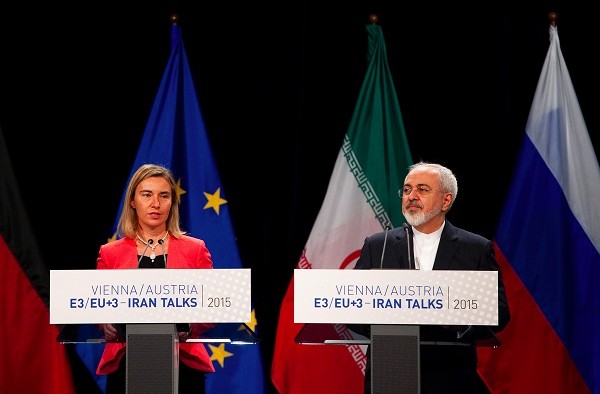
Image by European External Action Service
The participation of Foreign Minister Mohammad Javad-Zarif in the Vienna talks in October is a reluctant US-Saudi recognition of Iran’s importance in any future roadmap for the Syrian crisis. Since the Islamic revolution of 1979, and especially after the outbreak of popular protests in the Arab world, the two regional powers along the Persian Gulf have been jostling for influence and domination in Bahrain, Yemen and, above all, Syria. The move also signals a belated Saudi-Western recognition of the Iranian role and influence in resolving the four-year old crisis. With over 200,000 deaths the crisis has emerged as the witnessed the largest destruction and human suffering since the Iran-Iraq war.
The prolongation of the Syrian crisis adds two major threats. At one level, the crisis prevents the major stakeholders from evolving a coherent strategy vis-à-vis the Islamic State and from working towards the implementation of the UN Security CouncilResolution 2170 of August 2014 and 2249 adopted last November. At another level, the crisis has contributed to the refugee influx into European Union countries. According to the UNHCR until this December, 4.288 million Syrian refugees have registered in the neighbouring countries and ever since a small number of refugees entered Greece from Turkey in the late 2013, Europe has become a magnet for Syrian refugees. In 2015 an estimated 750,000 refugees have arrived in Europe, and most of them are Syrians seeking political asylum. Prolongation of the Syrian crisis is the major contributing factor.
For their part, Saudi Arabia and Russia—the principal backers of rival Syrian camps—continue to harp on the military option; the former sees President Bashar al-Assad as part of the problem in fighting against Islamic State and the other as part of the solution. Both of them have not given up the military option. With much fanfare in March 2013, Arab leaders asked the opposition rebels to take the Syrian seat in the Arab League but the opposition from Algeria, Egypt and Lebanon prevented the Syrian National Coalition (SNC) form taking it. Despite its financial power and political clout, changing the realities on the ground in Syria is proving to be daunting for Saudi Arabia. Riyadh has underestimated the resilience and staying power of the Assad regime, and ‘No role forAssad‘ can be a good news headline but it is not an ineffective policy option. Arming the rag-tag rebel forces, which includes salafi elements, is not a workable military option. For long, the position of the US and its Gulf allies is that Assad must go before any transition can be discussed. Iran’s invitation to the Vienna talks indicates a shift in Saudi strategy.
For his part, President Vladimir Putin hopes to consolidate the Assad regime by scaling down territories under the control of the Islamic State. His endgame appears to be the prevention of the regime’s collapse by ‘softening’ various anti-Assad groups and ‘eliminating’ their weapons caches. Without boots on the ground, the military capabilities of the Islamic State can be scaled down but not eliminated.
Since his hasty drawing of a redline over chemical weapons in September 2013, President Barack Obama has abandoned an effective policy option vis-à-vis Syria. What is his strategy? Hoping that attempts by Russia and Iran to prop the regime is “going to get them stuck in a quagmire and it won’t work.” In short, other than hoping for the failure of Russian military offensive, Obama has no policy on Syria.
Thus, the prolongation of the crisis and absence of an effective response both to the civil war in Syria and threats posed by the Islamic State have led to the inclusion of Iran for the Syrian talks. Tehran has strong stakes in Syria and over the years, has invested considerable political capital and military resources to shore up the Assad regime. Periodic reports of Iranian and Hezbollah casualties underscore its direct and indirect involvement in the crisis. The nuclear deal and emerging recalibration of the American interests in the Persian Gulf region and the absence of a viable alternative resulted in theUS engaging with Iran over Syria and recognition of its importance and relevance for the future of Syria. Iran offers political legitimacy to the international fight against the Islamic State and its role is central in Iraq as well as Syria. The common fight against the Islamic State has been bogged down into tactical differences between rival camps: Iran seeks to achieve this through Assad and Saudi Arabia without him.
Thus, geostrategic reality, shrewd political moves and the short-sighted policies of its adversaries have enhanced the role of Iran in any future dispensation in Syria. Whether one likes it or not, Iran is both part of the problem and solution; its support is critical for the survival of the Assad regime but at the same time, any post-Assad roadmap for Syria will not be possible without Tehran. And the invitation to the Vienna talks is a clear admission of the growing Iranian importance in the future of Syria.
sourche: http://www.e-ir.info/2015/12/10/iran-is-part-of-the-problem-part-of-the-solution/#.VmqNoLkELLs.facebook
Δεν υπάρχουν σχόλια:
Δημοσίευση σχολίου